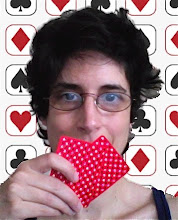“It is best to be both feared and loved; however, if one cannot be both it is better to be feared than loved.” Niccollò Machiavelli,
The Prince, 1532.
I first started playing poker seriously in a free tournament (hosted by the
National Pub Poker League) at a restaurant in Arlington, VA. I was having dinner with a friend, and I noticed people setting up poker tables in another part of the room. I had first played Texas Hold’em with a by-then-ex-boyfriend, and had already caught poker fever, but had no outlet for it. I’m afraid I spent a good portion of that dinner craning my neck curiously and wistfully toward the poker tables. The next week I was there, ready to play, nervous and excited.
I placed third out of forty-two my very first tournament. And my fate was sealed.
It took me awhile to place again. But I became a regular, made a bunch of poker-playing friends, and started to really learn the game. On Tuesdays, I would arrive early to get my preferred seat at my favorite non-smoking table, order dinner, and wait for the lambs to come to slaughter.
One evening, as I wiped the last of my dinner from my lips, I watched as two or three guys in succession made their way toward my table only to pull up short and veer off at the last minute as they realized it was me. The last one, a guy who I’d watched improve a lot over the previous few months, said, “I’d like to sit with you, Cardgrrl, but I’d also like to make the final table. See you there!”
The surge of satisfaction I experienced upon hearing these words cannot be properly conveyed. I felt powerful, wise, and permanent. I was feared, and
it was good.
Women’s liberation and the feminist movement in general notwithstanding, women in our culture are still brought up to want — first and above all — to be loved. We are encouraged to do everything possible to be desirable, acceptable, and emotionally unthreatening. We are taught to avoid or swiftly resolve conflict, not to engage it, take it on, or god forbid escalate it. Few men, for example, would put "intimidating" high on the list of desirable attributes in a mate. (It was, in fact, a source of some consternation to me throughout my youth that people did sometimes characterize me as intimidating, especially since I had no intention of being so, nor could I really understand why others perceived me that way.)
But it turns out that, at the poker table, Machiavelli is right. It
is better to feared than loved, if you have to choose between the two. This is especially true in tournaments. Tournaments are all about survival and domination, about putting your opponents to the test. If you cannot occasionally move an adversary off a hand when you need to, for example, you are utterly at the mercy of your cards and you are essentially playing bingo, not poker. Predictable behavior is not frightening: the bogeyman does not publish a schedule of his daily activities. He jumps out of the shadows, or emerges unexpectedly in the mundane environment of the laundromat (say), and wreaks bloody havoc.
That’s scary. The tyrant does not forgive and forget, or pursue civil justice under the rule of law: he punishes his enemies (and the occasional innocent, just because) all out of proportion to their sins against him, and shows up with the secret police pounding on the door in the middle of the night.
That’s intimidating.
While there are some benefits to having people like you (you may gain information, you may be given the benefit of the doubt, you may even get a break when you’re behind), they pale in comparison to the advantages gained by striking fear into your opponents’ hearts. I suppose if you could really somehow persuade your table mates that you were a harmless dumb bunny who was just getting lucky over and over that might be ideal. But realistically, that’s only going to work for awhile. Sooner or later any observant opponent is going to put two-and-two together and then, no matter how charming and careless you may appear, the fear and doubt are going to begin to set in. And then you have them.
In a cash game, the trick becomes how not to scare them so badly that they take their money and run away (which is why fear is especially useful in tournaments, where the sheep who fear fleecing cannot request a table change and only get up and leave when they bust out). Misdirection and charm are helpful: consider the table talk deployed so skillfully by a player like Daniel Negreanu, or the goofy but entertaining banter of Phil Laak. Even the obnoxious behavior of famous bad boys of poker like Mike “The Mouth” Matusow and Phil Hellmuth probably serves the same purpose: “Pay no attention to how well I’m playing, get aggravated at my annoying antics instead!”
The Prince must retain initiative and control, and be both feared and respected; these qualities serve the poker player equally well.
Labels: book, fear
